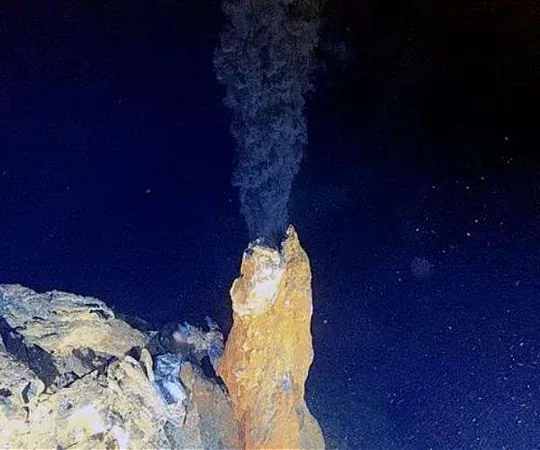
Radical Discoveries in the Arctic: Hydrothermal Vents Could Change Our Understanding of Life Beyond Earth!
2024-12-20
Author: Li
Groundbreaking Research in Hydrothermal Vents
A groundbreaking study has unveiled a surprising variety in the hydrothermal vent systems of the Arctic Ocean, fundamentally altering our perception of these underwater phenomena and their implications for potential extraterrestrial life.
Insights into the Polaris Hydrothermal Field
The research, published in the esteemed journal 'Earth and Planetary Science Letters,' reveals insights into the Polaris hydrothermal field located along the Gakkel Ridge. Previous classifications had labeled it as a typical volcanic “black smoker,” but recent explorations conducted during expeditions in 2016 and 2023 uncovered a far more complex system. Instead of the expected metal-rich plumes, the Polaris site emanates hydrogen- and methane-rich fluids, showcasing a unique vent system that diverges from the traditional understanding.
Diversity in Hydrothermal Vent Systems
Over 30 hydrothermal plume sites have already been identified along ultra-slow spreading mid-ocean ridges, yet detailed examinations of these systems remain limited. This study highlights a remarkable diversity of vent styles, with the Polaris site serving as a significant example. Chris German, a senior scientist at the Woods Hole Oceanographic Institution and co-author of the study, explains, 'Hydrogen-rich vents like Polaris have a vast reservoir of chemical potential energy, far exceeding that of typical hydrothermal vents, resulting in an exceptional range of microbial diversity.'
Implications for Astrobiological Research
This newly discovered variety is exciting not only for Earth-based ecology but also for astrobiological research. As the principal investigator for NASA's Exploring Ocean Worlds project, German has noted that these findings open up new avenues for the search for life on other celestial bodies. 'The discoveries we've made reassure us that we can credibly explore ocean worlds beyond Earth for possible life,' he remarked.
Future Hydrothermal Exploration
Lead author Elmar Albers, a postdoctoral investigator also at WHOI, expressed his astonishment at the unexpected nature of the results and highlighted their significant implications for future hydrothermal exploration across other oceans. Albers’ research received vital support from the Alexander von Humboldt Foundation, ensuring continued momentum in understanding these complex ecosystems.
Understanding Life's Distribution Across the Cosmos
Furthermore, Becky McCauley Rench, a program scientist with NASA's Astrobiology Program, underscored the importance of this research on our understanding of life's distribution across the cosmos. 'Understanding how and where life thrives on Earth is fundamental for our broader quest to explore life elsewhere in the universe,' she stated, drawing connections to the pursuit of life on icy moons like Europa and Enceladus.
A New Frontier in Life's Exploration
This unprecedented investigation into the hydrothermal systems beneath the ice-capped Arctic waters not only enhances our understanding of Earth's ecological intricacies but also sets the stage for future explorations that could redefine our approach to searching for alien life in the uncharted territories of our solar system. What lies beneath the surface could be the key to unlocking secrets of life across the universe!


 Brasil (PT)
Brasil (PT)
 Canada (EN)
Canada (EN)
 Chile (ES)
Chile (ES)
 España (ES)
España (ES)
 France (FR)
France (FR)
 Hong Kong (EN)
Hong Kong (EN)
 Italia (IT)
Italia (IT)
 日本 (JA)
日本 (JA)
 Magyarország (HU)
Magyarország (HU)
 Norge (NO)
Norge (NO)
 Polska (PL)
Polska (PL)
 Schweiz (DE)
Schweiz (DE)
 Singapore (EN)
Singapore (EN)
 Sverige (SV)
Sverige (SV)
 Suomi (FI)
Suomi (FI)
 Türkiye (TR)
Türkiye (TR)